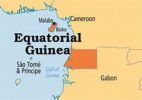While the growth outlook remains difficult, there are signs of a slight recovery of the non-oil sector in Equatorial Guinea, said the International Monetary Fund (IMF).
The statement came after IMF management completes first review of staff-monitored program with Equatorial Guinea.
“Program implementation through April 2018 was satisfactory. A revised 2018 budget is helping to strengthen the public finances. It would be important to sustain efforts to buttress the public finances and implement measures to foster diversification and good governance,” the IMF advised.
On August 16, 2018, the Management of the IMF completed the first review under the Staff-Monitored Program (SMP) with Equatorial Guinea.
The authorities continue to see the program as an instrument for bolstering capacity and helping build an adequate track record of performance that could serve as the basis for discussions on a potential Fund-supported program.
Notwithstanding still difficult economic and financial conditions, program implementation for the first review has been satisfactory. All but one of the end-April 2018 performance measures and indicative targets were met, some by wide margins, and fiscal space was created to increase social spending. The implementation of a revised 2018 budget has helped strengthen the public finances. Progress has been made on the structural agenda and the authorities remain committed to its implementation, but there are delays in some areas, particularly in those related to governance and transparency.
“Despite signs of an incipient recovery in the non-hydrocarbon sector, the overall growth outlook remains challenging, reflecting mainly a continued decline in hydrocarbon output,” IMF said.
Inflation remains subdued, driven by the economic slack and low world inflation. That said, macroeconomic imbalances have narrowed, reflecting the implementation of measures to strengthen the public finances and higher international oil prices. This has allowed an increase in government deposits at BEAC and an improvement in Equatorial Guinea’s reserves position at this institution, although the latter remains negative, according to IMF.
“Going forward, it would be important to sustain efforts to further strengthen the public finances, as well as to ensure the implementation of measures to support economic diversification and improve governance and transparency,” IMF said in its statement issued on Monday.
“IMF staff will remain engaged with the authorities to monitor progress with the implementation of their economic program and will continue to provide technical assistance and training to support Equatorial Guinea’s capacity-building efforts.”
Reports show that Equatorial Guinea saw very rapid economic growth following the discovery of hydrocarbons in the 1990s. Since 2014, however, the protracted fall in global oil prices, combined with the decline in the country’s output, the large budgetary surpluses that financed important investment programs that continue today have been declining, according to the African Development Bank.
The Bank stated that Equatorial Guinea’s GDP continued to shrink in 2016 and 2017, and the forecast for 2018 remains unfavorable. The decline is expected to stabilize beginning in 2019.
Authorities are relying on the stabilization of public finances and economic diversification to bring about new sources of growth. Consultations are under way with the IMF) on the possible implementation of a program under its Extended Credit Facility.

